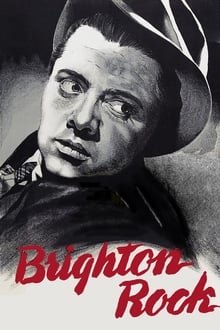
Of course it’s true, these atheists don’t know nothing.
Brighton Rock is directed by John Boulting and written by Graham Greene (also 1938 novel) and Terence Rattigan. Produced by Roy Boulting, it stars Richard Attenborough, Carol Marsh, William Hartnell, Hermione Baddeley, Harcourt Williams and Wylie Watson. Music is scored by Hans May and cinematography is by Harry Waxman. Plot finds Attenborough as small time Brighton hoodlum Pinkie Brown, whose attempts to cover up a murder sees events spiral out of control for himself and those closest to him.
1947 was a good year for tough, gritty British drama, in fact it was a key year in the progression of British cinema. It was the year that would see the release of They Made Me A Fugitive, It Always Rains On Sunday, Odd Man Out and Brighton Rock. The latter film, arguably the one that looks the most dated, is the one that shocked the most upon its release. Refreshing, then, to find that in spite of the aged edges of the narrative frame, it still today has a power, a bleakness, that justifies the classic status afforded it. Part seedy seaside noir, part character driven observation on Catholic guilt and torment, Brighton Rock overcomes some slight old time technical flaws to thrive on thematic potency and a tense narrative.
Many authors find their respective work losing impetus during the translation to the big screen, Graham Greene is one who hasn’t had to suffer in that department. Key issue for those adapting his work is to understand the characterisations at work, thankfully the Boulting brothers grasp that Pinkie Brown, surely one of Greene’s greatest creations, has a complexity that needs him front and centre of the brewing maelstrom. The plot then tumbles out around him, as the seedy underbelly of Brighton’s everyday life is exposed. The casting of Attenborough as Pinkie was a masterstroke, fresh faced and wide eyed, Attenborough plays it as coiled spring like, his psychosis troubling and ready to explode at any given moment. His cold hearted relationship with the homely, desperate for love, Rose (Marsh), is utterly disturbing, and it’s that relationship that underpins the story.
Story is set amongst two sides of Brighton, one side is sunny, full of lights, fun-fairs and candy floss, the other features grimy boarding houses, penny café’s and loud back street beer houses. The neat trick the Boulting’s pull is that we know the sunny side is merely a facade to darker forces, much of the badness is played out to the backdrop of seaside frivolity and relaxation. With the iconic pier serving as a dual witness to both the good and bad side of Brighton’s current denizens. Aided by Waxman’s oppressive photography, J Boulting paints in claustrophobic strokes, perfectly enveloping the lead protagonists in a number of restrictive set-ups, where the surroundings deftly match the mood of the individual. It’s going to end bad, it has too, the atmosphere tells us that, but the makers are reveling in tightening the noose one turn at a time, and that’s a sure fire bonus for film noir lovers.
Film is well cast across the board, with Hartnell most notable as Pinkie gang member, Dallow, while Baddeley as Pinkie’s bold and brassy adversary, Ida Arnold, is suitably annoying. Memorable characters, one and all, each one serving to add fuel to Attenborough's malevolent fire. How great it is to also take away a number of memorable scenes from the movie. From the pulse raising chase at the beginning; to the weird and haunting brutality of a ghost train sequence, and to the cruel finale that drips with cynicism, it’s a film that refuses to leave the conscious after the credits have rolled. The ending may have been toned down from that of the novel, but what remains still bites hard, as does, in truth, the whole film. 9/10